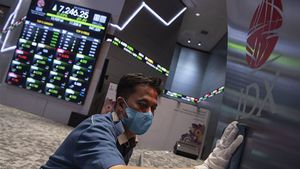JAKARTA - The Financial Services Authority (OJK) assesses that Indonesia's banking conditions are quite solid in dealing with various pressures and conditions that threaten the resilience of global banking.
"Various indicators show that Indonesia's banking is in good condition. As an illustration, in the banking sector in January 2024, the capital adequacy ratio (CAR) is 27.54 percent with a core capital ratio (tier 1 capital) to CAR of 94.41 percent," said OJK Banking Supervision Chief Executive Dian Ediana Rae in Jakarta, quoted from Antara, Friday, March 8.
In comparison, the core capital ratio of US banking was 14.41 percent and the European Union was 17.03 percent.
In addition, Dian said that Indonesia's banking liquidity performance was well maintained, including being shown by the liquid cover ratio (LCR) of 231.14 percent.
This liquidity condition is also much better than the LCR ratio in other jurisdictions. In the European Union, for example, the LCR ratio is 158.78 percent and 125.80 percent, respectively.
According to the Basel Committee on Banking Supervision (BCBS), under current conditions, there are two main risks that need to be watched out for because they can test global banking vulnerabilities, namely the weakening of the commercial property market and the bank's links to non-bank financial services institutions.
Dian said that currently, Indonesian banking is still maintained from these risks discussed by BCBS.
The three economic sectors that contributed the largest credit in the January 2024 position were the household sector (23.67 percent), large trade (15.81 percent), and the manufacturing industry (15.65 percent), while the real estate sector only contributed 5.09 percent of total bank sector loans.
OJK has taken a number of steps so that regulations in the banking sector in Indonesia are in line with various initiatives that have been or are being carried out by BCBS.
Indonesia has all adopted the framework of Basel III Reforms in January 2024 or faster than jurisdictions such as the European Union and the United States which will only implement it in July 2025.
SEE ALSO:
In addition, OJK has issued a consolidative paper related to effective management principles over climate-related financial risks, taxonomy for sustainable finance, and climate risk management and scenario analysis (CRMS) guidelines as a form of policy support from OJK for climate change risk management in the banking sector.
OJK will continue to anticipate various dynamics of global economic and banking policies. Global geopolitical tendencies and volatility of market conditions will continue to occur with various dynamics.
Throughout the principles of prudence and healthy banking practices that are maintained, Indonesian banking will remain resilient and will continue to grow healthily as is the current condition.
Coordination between authorities, especially OJK and Bank Indonesia, the Ministry of Finance, and Deposit Insurance Corporations that are members of the Financial System Stability Committee (KSSK) will continue to be improved to ensure the stability of the national financial system is maintained.
The English, Chinese, Japanese, Arabic, and French versions are automatically generated by the AI. So there may still be inaccuracies in translating, please always see Indonesian as our main language. (system supported by DigitalSiber.id)
















